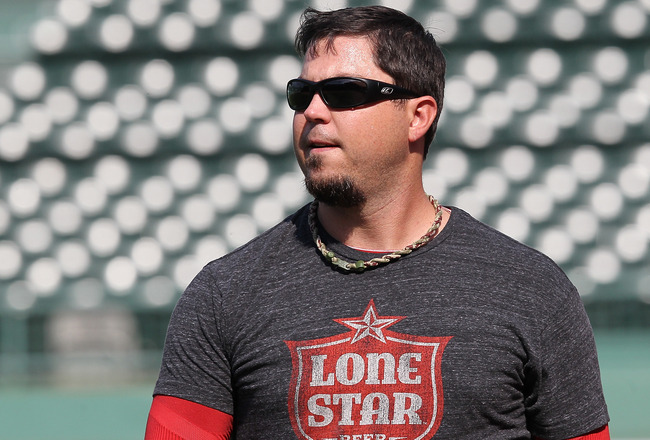 |
| Photo by Jeff Haynes, Reuters |
Derek:
Insofar as Beckett's pursuit of (drinking and) golf interferes with his job, it is assuredly a problem. I mean, if golf (and/or alcohol) interfered with my job, I'd be fired and Beckett makes far more money (for a far less meaningful 'job').
That said, proving that his baseball troubles stem from disinterest and/or distraction is another matter entirely. Thus, the converse also holds: insofar as they are not interfering with his ability to do his job, the public outcry is potentially unfair. More often than not claims of disinterested play seem to come about in bi-directional fashion (see Yunel Escobar). That is, teams with rules/standards/practices that don't connect well with a given player's demeanour (much like management disconnect from staff in many workplaces) fails to generate a substantial return on investment. Often when struggles arrive, press, fans, managers grasp at straws: Beckett is struggling at baseball while golfing a lot, therefore golf must be the problem.
However, Josh has every right to golf and perhaps we should simply stop at the first clause ("Beckett is struggling at baseball.") Golf, alcohol, personal problems aside, when most players struggle to this degree changes are made (trades, demotions, placed in bullpen or on DL, etc) but it seems to me that placing the blame on Beckett's non-baseball activities does little to resolve the problem.
 |
| Photo by Jim Rogash, Getty |
Nathan:
It is tempting to unite with Boston fans and media in indicting
Josh Beckett for playing golf during the season, particularly on the
heels of last year's chicken and beer fiasco. After all, pro athletes
like Beckett make a relative fortune playing a game many of us pay to
play in our leisure time. Tempting as it might be, however, it isn't
fair.
The disciplinary structure of high
performance sport instructs athletes to understand their bodies as
machines. That is, it encourages a dualistic approach that separates the
mind from the body and positions the latter as inferior and thus
subordinate to the former. This is an instrumental approach to the body
that makes it possible to treat it as a weapon in violent sports that
can inflict harm on the other, and, slightly more benignly, as a tool to
be manipulated by the mind in others like baseball. Part and parcel of
this dualism is the notion that the body must be cared for like a
machine--it must be fed, watered, and conditioned to achieve optimal
performance. Like a machine, however, it also means that the body is
disposable. It is a means to and end, and that end is ultimately more
important than the costs accrued to achieve it. Thus, the athlete is
exhorted to destroy the body in the quest to win for the team, and for
the fans who vicariously find meaning through the team.
 |
| No credit found for this one, unfortunately! |
Neil:
I'm a big fan of Dirk Hayhurst - relief pitcher (former Blue Jay!), blogger, memoirist, and fantastic Tweeter - and, in thinking about Beckett, I'm going to draw a bit of inspiration from his own ruminations on this topic.
A career-minor leaguer, Hayhurst has made a whole 25 appearances at the big-league level, (and, barring a miracle, won't make another) and is unapologetically honest when it comes to talking about the stresses and pressures that come with being a pro athlete. So, when Hayhurst is asked to either tell kids that they should 'play for the fun/love of it', or is criticized by fans/parents/coaches because his writing is too serious and shows that he doesn't just 'play for the fun/love of it', he inevitably disappoints them. Because, for Hayhurst, it isn't particularly fun - it's his job, (both the baseball and the writing that it inspires) he has responsibilities to his team and the fans, and it's how he feeds his family. But he also talks about the moment where pros admit to 'not caring anymore', and by this he doesn't mean that they stop playing hard - he means that they accept that their careers will eventually end and they need to have something more going on in their life.
So, where am I going with this? I can't help but feel that some of the animosity has to do with the bizarre expectation that athletes must be 100% committed to their sport, every single moment of every single day, at least during the season. We have this weird expectation of pro athletes that suggests that proper "discipline" or "focus" requires complete devotion, if not unhealthy obsession. But playing other games, showing interest in other things? This is good. Beckett needs to be doing these things for himself, owes it to himself to live a balanced life and develop a wide range of skills and interests, because his baseball career will be over before the end of the decade.
But the baseball job? Like Hayhurst says, Beckett isn't just doing that for himself. And to the extent that golf could easily lead to an injury that affects his ability to pitch, it's a bad idea. (It's possible that Beckett has a technically sound golf swing and that his swing coach and doctor are in agreement that the muscles he uses in his swing are not the same muscles that he injured pitching. But I find that kind of forethought very unlikely.) It has nothing to do with optics, (although, certainly, it does look bad) and everything to do with living up to the responsibility he has to others - his family, his teammates, the people of Boston. (And, I begrudgingly admit, to the guys who directly employ him. They do, after all, owe him another $45 million, give or take a couple million bucks.)

No comments:
Post a Comment